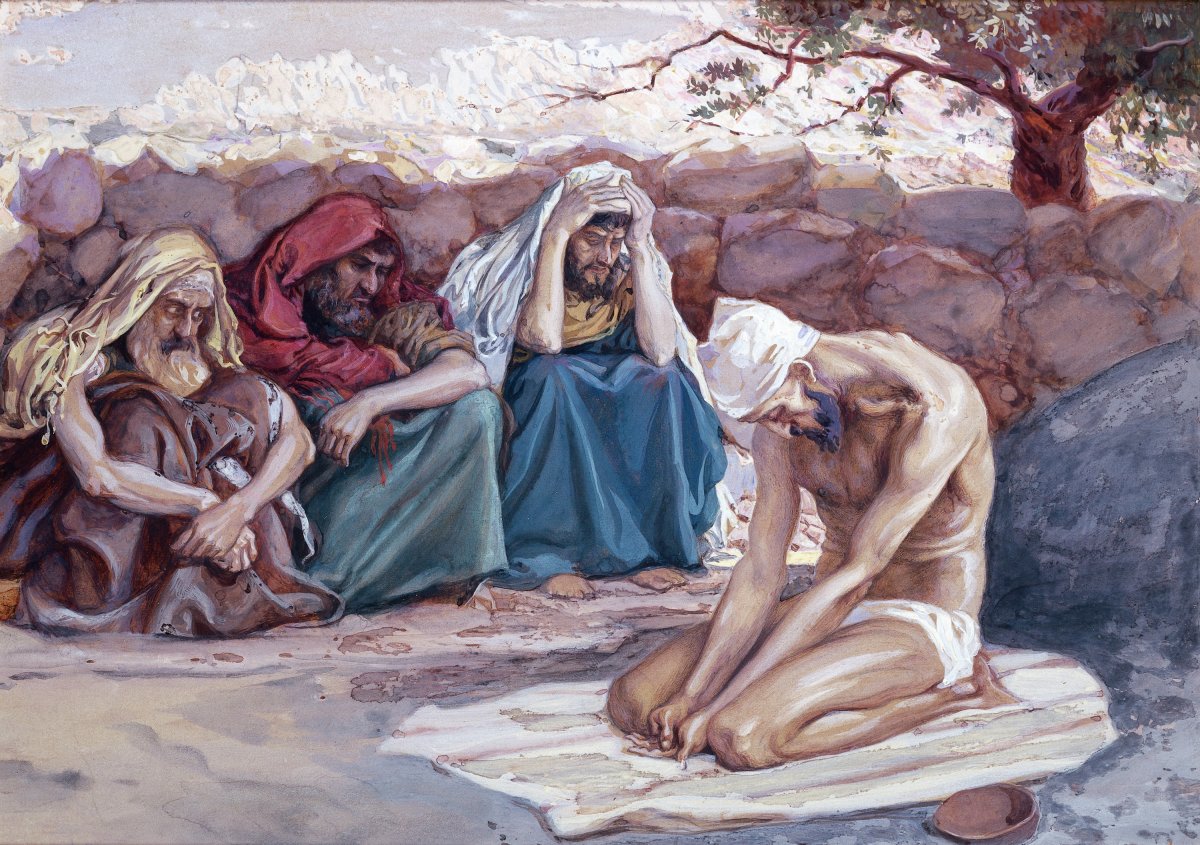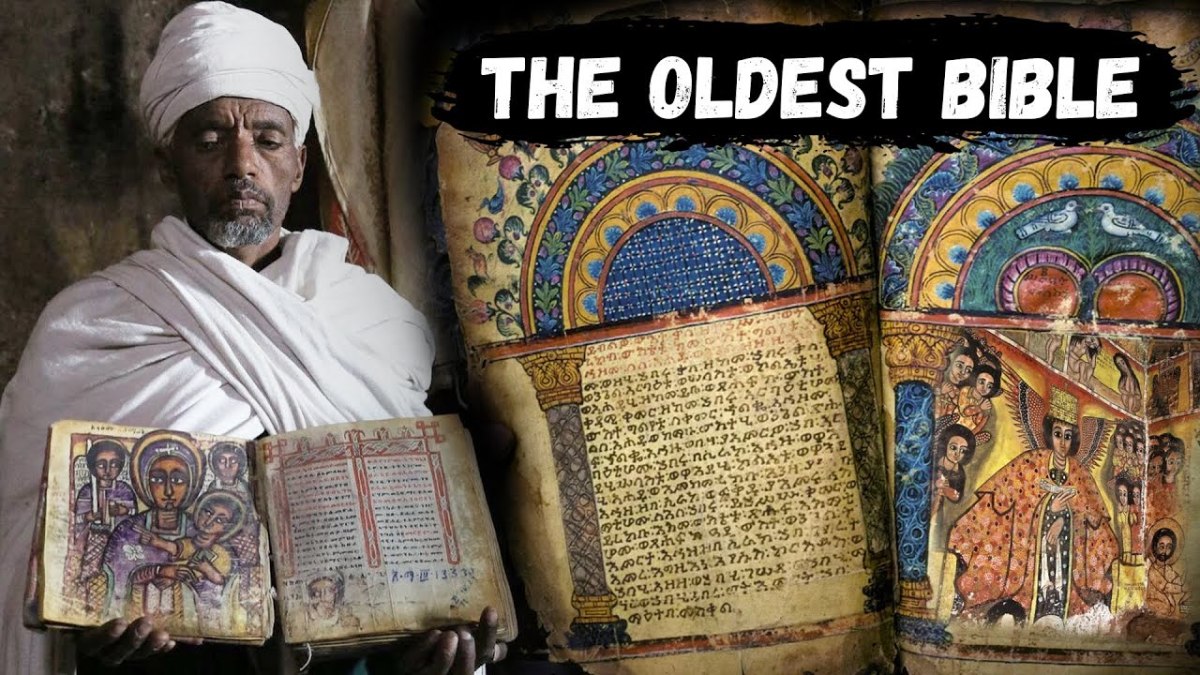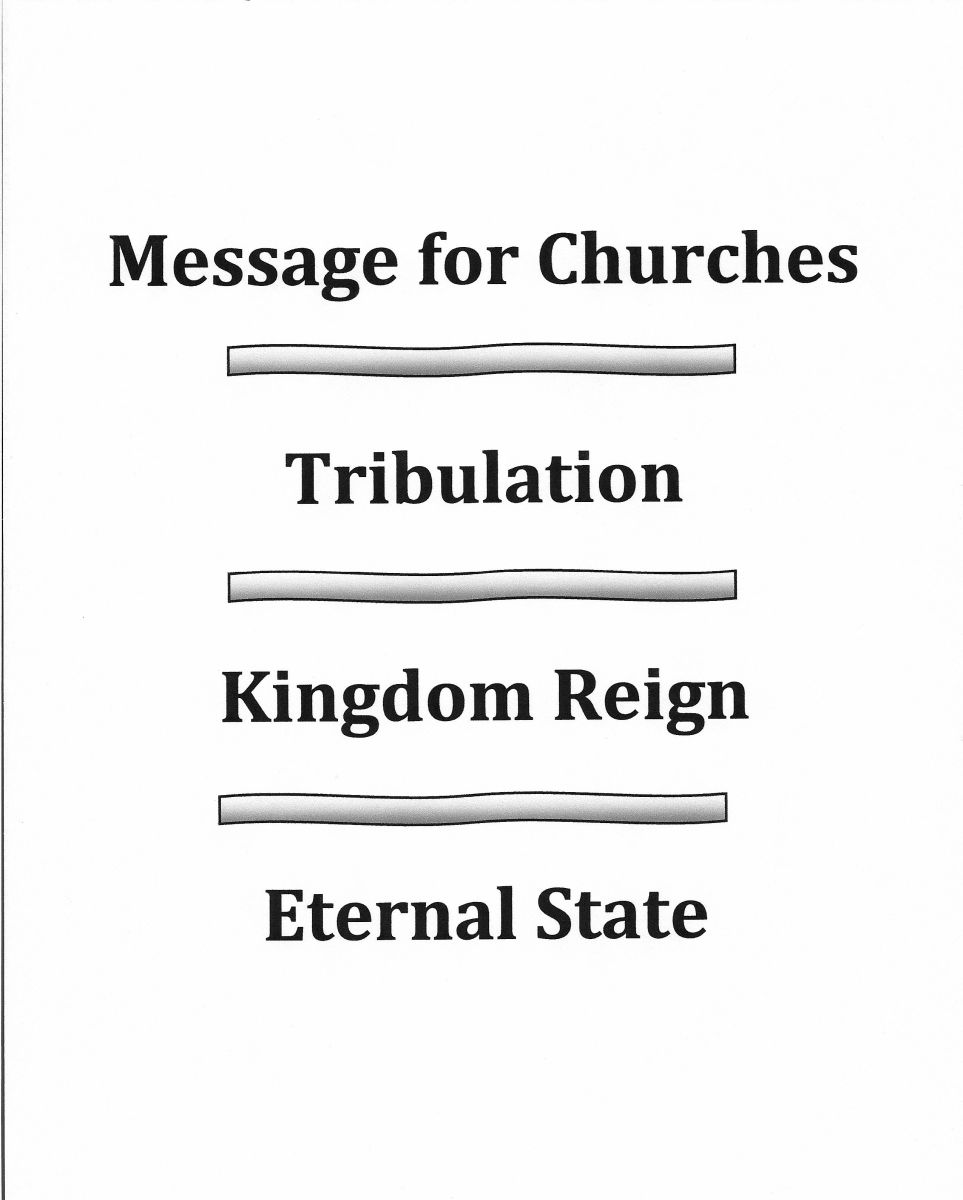Bible: What Does Luke 1 Teach Us About the Births of John the Baptist and Jesus the Christ?
Luke, the Evangelist
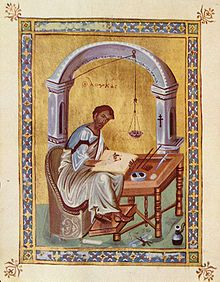
The Gospel of Luke
Luke 1
Several “non-routine terms”—words that require further explication—appear in Luke’s dedicatory address to Theophilus (“friend of God”) [vv. 1-4].
First, the words “narrative” and “account,” as linked with “set in order” and “orderly,” pointedly indicate the author knows about many versions of the “things which have been fulfilled/most surely believed/accomplished among us.”
Having done his own thorough investigation into the subject matter, he intends to “add his contribution to the mix” (vv. 1, 3).
Commentary: That Luke engaged in laborious research to pen his gospel proves that the Holy Spirit did not merely dictate what he should write, but that He used the writer’s own personality and training to accomplish His purpose.
Second, the terms “eyewitnesses” and “ministers of the word,” describing those who disclosed these true stories to “us,” show that Luke works as a historian, not as one who actually walked with Christ and proclaimed His message from the beginning of the Gospel story (v. 2).
[The word “minister” here is huperetai (“underrowers”), the same term the Apostle Paul used to describe Christian leaders entrusted to teach the Word of God (cf. 1 Cor. 4:1). See Ryrie’s note (New Testament Study Bible, 93)].
Third, the term “certainty” or “exact truth” testifies to Luke’s belief that his version will serve to enlighten Theophilus about the instruction he has received.
[While this statement does not cast aspersions upon any gospel in particular, it does seem to indicate the need for someone to introduce a fuller perspective.]
Luke assures his reader of the accuracy of his report, having “perfect understanding of all things from the very first”; however, he does not explicitly claim inspiration for his writing (v. 4).
[Although he does not claim his work is “God-breathed,” that omission does not mean that his gospel does not possess that quality. In this writer's view, Luke's gospel is canonical.]
Unique to Luke’s gospel is his account of the angel Gabriel’s announcement to the old priest Zacharias regarding the conception and birth of his soon-to-be-great son, John (the Baptizer) [vv. 5-25].
Consistent with the detail-oriented nature of his writing, the author delineates several background facts of historical and religious significance:
(1) The time period Zacharias received this good news (“in the days of Herod, the king of Judea”)—a period of political unrest
(2) Zacharias’ occupation and lineage (“a certain priest . . . of the division of Abijah”); and
(3) The lineage and name of his wife (“of the daughters of Aaron . . . Elizabeth”) [v. 5].
He also reveals elements of a more personal nature regarding the couple:
(1) They were righteous before God (v. 6a);
(2) They performed their religious duties blamelessly (v. 6b); yet
(3) They were childless, Elizabeth being barren and both being “elderly” (v. 7; cf. Gen. 16:1; 17:17).
The Angel Gabriel

As God would have it (implied), Zacharias is chosen by lot to burn incense in the temple (vv. 8-9)—a privilege “permitted only once in a lifetime for any priest” (Ryrie, New Testament Study Bible 104).
[Zacharias has waited almost forty years to perform this temple task].
While he is performing this service “the whole multitude of the people” prays outside, presumably for Zacharias’ protection against any breach of protocol (v. 10).
Suddenly, “an angel of the Lord”—he calls himself Gabriel (“man/warrior of God”) later (v. 19)—appears to him. Why Luke attaches significance to Gabriel’s location is unknown (v. 11).
Understandable feelings of concern and fear fill the old priest’s heart as he looks upon the angel (v. 12); however, Gabriel quickly assuages these alarms, announcing a special message that involves a serious (though wonderful) life change for Zacharias and his wife (vv. 13-17).
Coming in answer to his prayer—probably the couple’s decades-long petition to have children—the angel declares Elizabeth’s years of barrenness ended (v. 13b).
Not only does Gabriel instruct Zacharias what name he must call his newborn son—a name specially chosen by God (v. 13c)—he also foretells what kind of community reaction John’s birth would elicit (“joy and gladness,” “rejoice”) [v. 14].
John the Baptizer
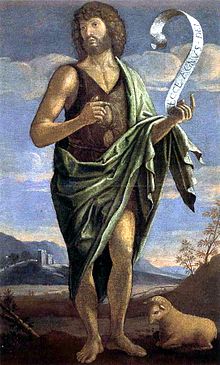
The rest of his announcement the angel dedicates to a description of the adult John’s manner of life (v. 15) and his ministry objectives (vv. 16-17).
God’s general evaluation of John’s whole life (“great”) precedes His mention of the latter’s total abstinence from intoxicants as well as his “drunkenness” with the Holy Spirit from his pre-natal days (v. 15; cf. Eph. 5:18; Jer. 1:5).
In John’s position as the Elijah-like forerunner of the Lord (v. 17a; cf. Mal. 4:5-6), he will preach repentance with marked success among the Jewish remnant, seeking to prepare them to enter Messiah’s kingdom (vv. 16, 17b).
Zacharias’ rationalization (rather than his pure faith in Gabriel’s word) [v. 18], however, causes him to suffer temporary muteness (vv. 19-20).
[When God told Abraham that his descendants would be as the stars of heaven—a promise even more awesome than the one delivered to Zacharias—the patriarch believed Him (cf. Gen. 15:5-6; Rom. 4: 16-22).
Despite personally receiving convincing empirical evidence (that is, Gabriel’s appearance and message) and possessing biblical proof in Abraham, Zacharias failed to believe.
As God’s grace would have it, however, the priest’s dumb condition lasted only until John’s birth.]
Awaiting Zacharias
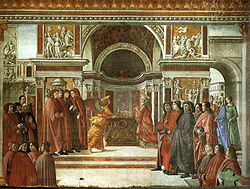
Outside in the temple courtyard the people fear the worst, for the priest has spent an inordinate length of time performing his duty (v. 21).
When he finally emerges speechless (literally and figuratively), they deduce that Zacharias had seen a vision (v. 22).
His days of service completed, the priest returns home; soon thereafter, Elizabeth conceives a child and secludes herself for five months, regarding her pregnancy as the way the Lord removed her “reproach”—Jewish culture considered barrenness in women as such—from among people (vv. 23-25).
The Angel Gabriel

The Birth of Messiah Jesus
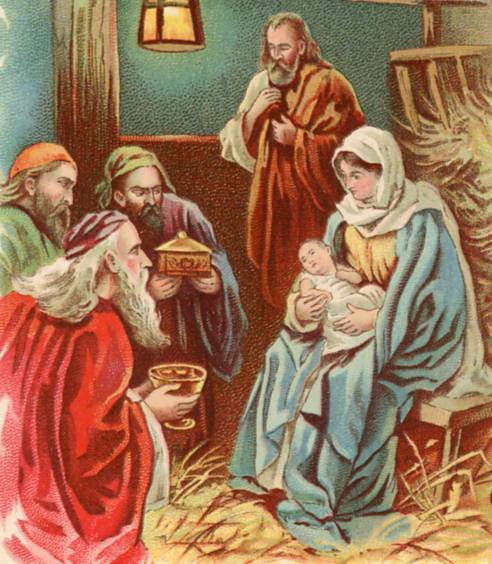
In Elizabeth’s sixth month, Gabriel makes a second visitation.
This time, however, he appears to a certain virgin, Mary, a young woman engaged to “Joseph, of the house of David” (vv. 26-27).
Addressing her as “highly favored one”—a word found “elsewhere only in Ephesians 1:6 where all believers in Christ also are said to be filled with grace” (105)—the angel exhorts her to “rejoice, for the Lord is with you,” and pronounces her “blessed” among women (v. 28).
[While God regards Mary as “highly favored” and “blessed among women,” the Scriptures do not exalt her to a position higher than any other Christian.]
Mary’s reaction, while similar to Zacharias’, seems to focus more on Gabriel’s saying itself rather than on his appearance; she is “troubled” by it, and she wonders “what manner of greeting this was” (v. 29).
After seeing the young woman’s fear, Gabriel immediately comforts her with a reassuring word of God’s favor upon her (v. 30).
Now somewhat prepared to receive his announcement, Mary listens to the angel speak about her conceiving and giving birth to a son, Jesus (v. 31).
As concerning her question—the type an ordinary Jewish teenage girl would ask—(v. 34), it seems possible that she stopped listening immediately after hearing that she was going to be a mother.
Gabriel lists amazing facts about Jesus:
(1) He will be great (v. 32a);
(2) He will be called the Son of the Highest (v. 32b);
(3) He will receive the throne of David from the Lord God (v. 32c);
(4) He will reign forever over Israel (v. 33a); and
(5) His kingdom will last forever (v. 33b). About these statements, Mary does not ask anything.
Considering her age and relative immaturity, the angel does patiently answer her legitimate query without rebuke.
[Compare his response to Zacharias, the priest who should have known better, 1:19-20.]
Speaking in the parallel form common in Hebrew poetry, Gabriel tells Mary that the Holy Spirit (the power of the Highest) will so act upon and within her that she will bear a “Holy One” who will be given the title “the Son of God” (v. 35).
[See Ryrie’s concise theological statement describing the Incarnation (105).]
Aiming to show Mary that God can do all things (v. 37), the angel now shifts her attention away from her question by revealing to her that the Lord had already performed another miracle close to home; namely, old cousin Elizabeth, once barren, is now in her sixth month (v. 36).
Acknowledging herself as a maidservant of God, Mary humbly submits herself to the Lord’s will (v. 38).
Mary Visits Elizabeth
Soon thereafter (“in those days”) Mary visits Elizabeth in the hill country of Judah, and greets her in Zacharias’ home (vv. 39-40).
The “fetus” of six months “leaps” in her womb when Elizabeth hears Mary’s voice, and immediately the Holy Spirit “fills” (takes control of) Elizabeth (v. 41).
Excitedly, the pregnant woman reiterates part of Gabriel’s announcement (“Blessed are you among women”), and reveals the “blessedness” of the “fruit” of Mary’s womb, i.e., Mary is already pregnant with Jesus (v. 42).
[Therefore, the “overshadowing” must have taken place immediately after Gabriel’s visitation.]
Elizabeth feels humbled that “the mother of my Lord” should visit her (v. 43).
[Obviously, the Holy Spirit communicated revelation to Elizabeth; she knew that Mary was carrying the God-man inside her.]
She interprets the fetus’ movement as a leap for joy, indicating that the Holy Spirit enabled the unborn John to recognize the voice of Jesus’ mother (v. 44).
[Just how much can the “normal” unborn child sense of the events of the outside world?]
Finally, Elizabeth pronounces Mary “blessed,” because the latter believed the Lord’s word regarding Christ’s conception (v. 45).
[“Blessed” here probably means honored.]
Mary's Song
view quiz statisticsMary's Praise for God, Her Savior
Verses 46-55 comprise the so-called “Magnificat”—a title derived from the first word of the Latin translation and attached to Mary’s song (106).
Originating from her “soul,” Mary’s tribute begins by declaring the greatness of the Lord (v. 46).
The Hebrew poetic parallelism indicates three sets of synonymous terms: “spirit” to “soul,” “rejoiced” to “magnifies,” and “God my Savior” to “Lord” (v. 47).
[“Declaring the greatness” appears to be a soul-related activity—one that involves the intellect, emotions, and will—while “rejoiced” seems to originate in the spirit—a deeper well in human nature.
Notice also that Mary calls the Lord “God my Savior.”
Unless she is using the term “Savior” to indicate physical deliverance here, does not Mary in her word usage admit to her sinfulness and thus contradict the Roman Catholic teaching of the Immaculate Conception?]
Next, she offers a reason for her praise and joy: though a maidservant of low social status, she has received honor from God that will increase her esteem in the eyes of humanity (v. 48).
Her song emphasizes both the attributes and the deeds of her God (vv. 49-55). She links His might with His holiness as the source of His benevolence toward her (v. 49).
Turning from individual to national benefits, she quotes Psalm 103:17—a verse referencing His mercy as the “reward” for those who fear (show reverence toward) Him (v. 50).
Not only does God’s “strong arm” (anthropomorphism) exalt humble individuals (v. 52b), feed the hungry (v. 53a; cf. Ps. 107:9), and aid Israel His servant in “remembrance of His mercy” (v. 54a), it also scatters the proud (v. 51b), puts down mighty rulers (v. 52a), and sends the rich away empty (v. 53b).
The Lord shows Himself strong on behalf of those who, under Abraham’s Covenant, serve Him humbly (v. 55).
After Mary concludes her song, Luke reports that she stayed with Elizabeth until the latter became full term (v. 56).
Zacharias Names His Son
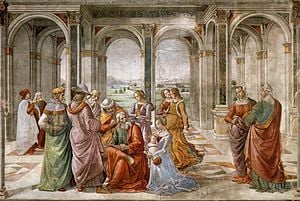
The narrative now returns to complete the account of Elizabeth, John, and Zacharias (vv. 57-80).
First, it records the birth of Elizabeth’s son (v. 57) as well as the community and family joy over the Lord’s mercy toward her (v. 58).
Second, the story proceeds to recount the child’s circumcision and the brief controversy over what his name should be (vv. 59-63).
[Why was it important that the parents name their child after a relative? In case of the parents’ death, would the named relative assume guardianship over the child?
Why should the relatives marvel that the parents would agree to name the child John?
Perhaps because of the revelation, Zacharias knew that worldly possessions would mean nothing to his son, so he does not name him after himself.]
Third, with his period of chastisement complete, the old priest receives back his ability to speak, an ability that he immediately employs in the praise of God (v. 64).
The Judean hill country, abuzz with this miraculous news, ponders the future exploits of this child upon whom the “hand of the Lord” apparently rested (vv. 65-66).
The Filling of the Spirit
view quiz statisticsJohn MacArthur
Zacharias’ prophecy (vv. 67-79) comprises the rest of chapter one (except for a brief summary of how John grew spiritually and spent years of preparation in the wilderness, v. 80), and may constitute his first words after his restoration (cf. v. 64).
As Elizabeth had been “filled with the Holy Spirit” and had spoken wondrously of Mary’s baby (cf. v. 41), so now the priest, likewise under His control, foretells not only the coming redemption of Israel (vv. 68-75), but also his son’s preparatory role in the fulfillment of that salvation (vv. 76-79).
[What connection exists, if any, between the “filling with the Holy Spirit”—an action resulting in miraculous events here and elsewhere in this chapter—with the Apostle Paul’s command for Church believers (cf. Eph. 5:18)?]
Zacharias first praises “the Lord God of Israel,” and then delineates three divine acts that moved him to worship:
(1) He has visited (lit. looked upon, observed with care and practical interest) His people (v. 68a);
(2) He has redeemed (lit. made a release of, bought back from the slave market and set free) them (v. 68b);
(3) He has raised up for us a “horn” of salvation (v. 69a; cf. 2 Sam. 22:3), i.e., a powerful Savior (107) in faithfulness to the Davidic Covenant (“in the house of His servant David,” v. 69b; cf. 2 Sam. 7:14) and in fulfillment of ancient prophecy (v. 70; cf. Jer. 23:5).
The Lord purposed to save Israel from their enemies (v. 71; lit. “Salvation from our enemies”—a seeming cry of exultation) in performance of His promised mercy (v. 72a) and in remembrance of His holy covenant/oath—the Abrahamic (vv. 72b-73, cf. Gen. 22:16-18), so that they might serve God
(1) without fear (v. 74),
(2) in holiness and righteousness (v. 75a; cf. Zech. 14:20-21; Is. 62:1-4), and
(3) all the days of our life (v. 75).
Next, Zacharias turns toward his newborn and foretells what John will be/do (vv. 76-79). As “the prophet of the Highest” (v. 76a), John will function as the forerunner of the Lord, i.e., one who appears on the scene before Him (cf. Mal. 4:5-6).
One of John’s roles is to “prepare His ways”—an action amounting to giving “knowledge of salvation to His people by the remission of their sins” (vv. 76b-77). This task John will perform through his “baptism unto repentance” ministry (cf. 1:17).
God’s people will receive forgiveness through His “tender mercy” mediated by the visitation of the “Dayspring from on high” (lit. the Dawn, symbolic of the Messiah) [v. 78; cf. Mal. 4:2].
Messiah will also “give light” to the Gentiles (“those who sit in darkness and the shadow of death,” cf. Is. 9:1-2; 2 Cor. 4:6), and guide His people into a peaceful national life (v. 79; cf. Rom. 3:17)—something with which they have been altogether too unfamiliar.
[By enlightening the Gentiles (salvation) and guiding forgiven Israel with His wise counsel, Christ will bring about universal peace (lack of hostility).]
© 2013 glynch1





